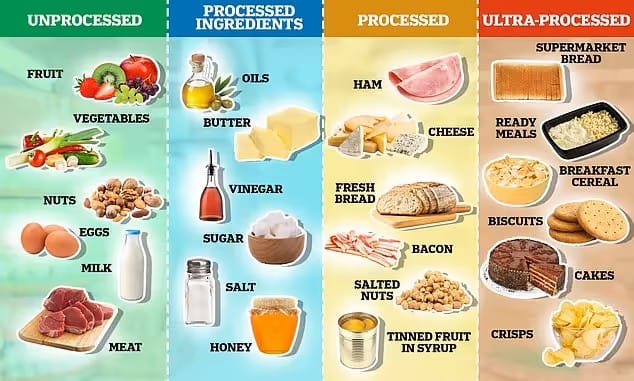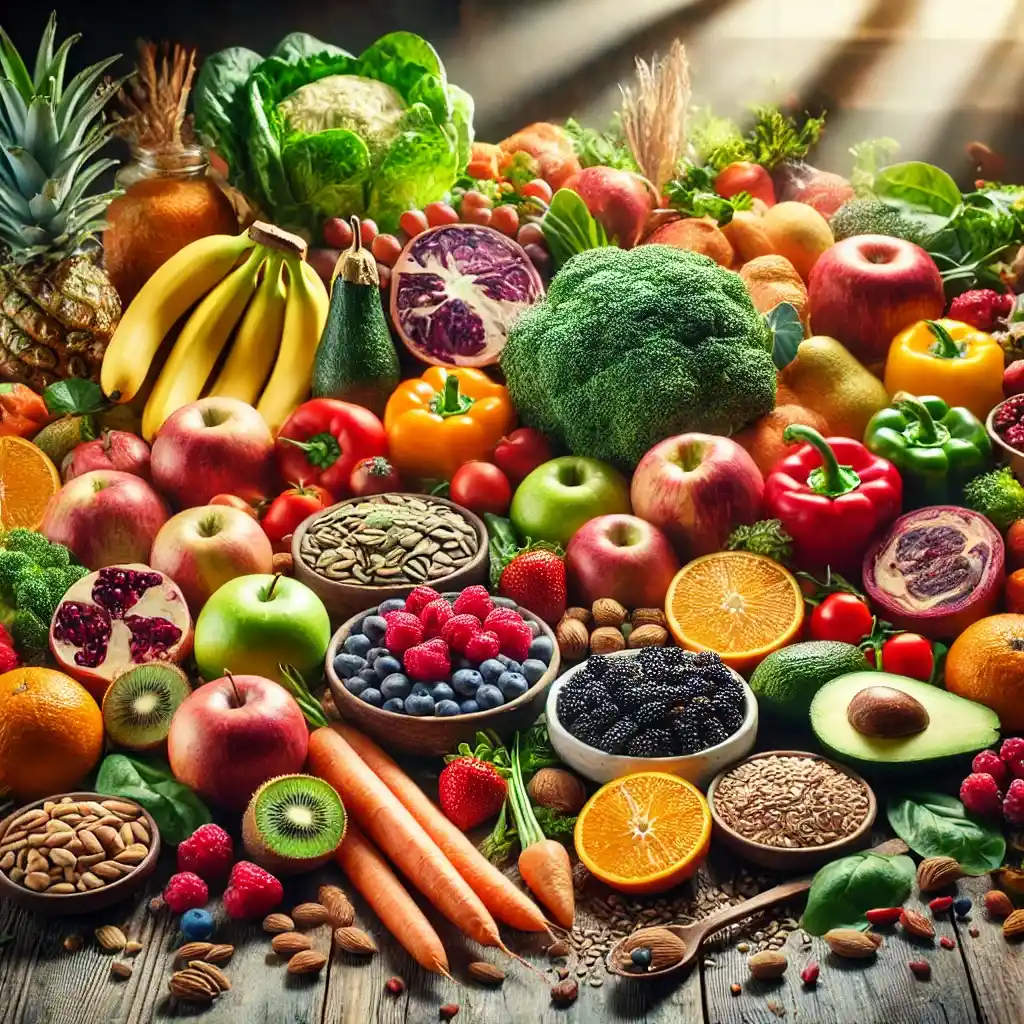In today’s fast-paced world, ultra-processed foods (UPFs) have become staples in many households. They're quick, convenient, and often irresistibly tasty. But beneath their appealing exterior lies a darker reality. Emerging research highlights their alarming impact on health, including associations with excess weight, increased body fat, and even risks of mouth, throat, and gastrointestinal cancers.
Let’s explore ultra-processed foods, their dangers, and how to transition toward a healthier diet. Along the way, we will answer frequently asked questions and inspire you to take the first step toward a lifestyle that prioritizes whole, natural foods.

What Are Ultra-Processed Foods?
Ultra-processed foods have five or more ingredients, including additives and preservatives, designed to extend shelf life or enhance flavor and texture. These foods undergo extensive manufacturing processes that strip them of the most natural nutrients. Examples include:
- Ice cream, chips, and cookies.
- Soda and fruit-flavored yogurts.
- Instant soups and ready-to-eat meals.
- Products containing emulsifiers, artificial sweeteners, and hydrogenated oils.
While these foods are convenient, they are laden with chemicals and additives that can disrupt the body's natural balance and pose long-term health risks.
The Health Risks of Ultra-Processed Foods
- Weight Gain and Obesity
UPFs are calorie-dense but nutrient-poor. Their high sugar, fat, and starch content leads to overeating without satisfying hunger, contributing to weight gain and obesity. - Increased Risk of Chronic Diseases
Diets high in UPFs are linked to:
- Type 2 diabetes and heart disease due to added sugars and unhealthy fats.
- Gastrointestinal issues, as the additives and preservatives disrupt gut health.
- Cancer Risk
New studies suggest that regular consumption of UPFs may elevate the risk of certain cancers, including those of the mouth, throat, and gastrointestinal tract. - Mental Health Concerns
A growing body of evidence links UPFs to mental health disorders, including depression and anxiety. These foods' lack of essential nutrients can affect brain function and mood stability.
Why Are Ultra-Processed Foods So Addictive?
Manufacturers design UPFs to trigger the brain’s reward system through sugar, salt, and fat. These "bliss points" make them difficult to resist and can lead to overconsumption. Moreover, artificial flavors and textures mimic the sensory appeal of natural foods, making it harder to distinguish between real and processed options.

Breaking the Habit: Transitioning to Whole Foods
Switching from ultra-processed foods to a diet centered on whole, natural ingredients may seem daunting initially, but small steps can lead to lasting change. Here’s how to start:
1. Understand What Whole Foods Are
Whole foods are unprocessed or minimally processed and retain their natural nutrients. Examples include:
- Fresh fruits and vegetables.
- Whole grains like quinoa and brown rice.
- Lean proteins such as chicken, fish, and legumes.
- Nuts, seeds, and healthy oils (e.g., olive oil).
2. Read Labels Carefully
Be wary of long ingredient lists and avoid items with artificial additives, emulsifiers, or unfamiliar chemicals.
3. Cook at Home
Preparing meals from scratch lets us control the ingredients and avoid hidden sugars, salts, and fats.
4. Plan Meals
Meal prepping can reduce reliance on quick-fix processed options. Stock your pantry with healthy staples to make wholesome cooking easier.
5. Practice Moderation
It’s unrealistic to eliminate UPFs entirely. Allow occasional indulgences while focusing on whole foods for most of your meals.
6. Follow Serving Size Suggestions
All labels show portion amounts for a single serving. We can prevent overeating by following these guidelines, which is especially important if we eat UPFs. It is helpful to understand portions by using measuring cups and spoons or a food scale to weigh items so we know exactly how many calories, fat, sugar, carbs, and protein we consume each meal.
The Benefits of a Whole-Food Diet
- Weight Management
Whole foods are rich in fiber and nutrients, keeping you fuller for longer and reducing overeating. - Improved Digestive Health
Fiber-rich fruits, vegetables, and whole grains support gut bacteria, improving digestion and nutrient absorption. - Reduced Risk of Chronic Diseases
A diet based on whole foods is associated with lower risks of heart disease, diabetes, and certain cancers. - Enhanced Mental Well-being
Whole foods provide essential nutrients that improve brain function and mood stability, reducing the risk of mental health disorders. - Increased Energy Levels
The natural nutrients in whole foods provide sustained energy throughout the day, unlike the quick but short-lived energy spikes from UPFs.
Sample Meal Plan for Transitioning Away from Ultra-Processed Foods
Day 1
- Breakfast: Oatmeal with fresh berries and a drizzle of honey.
- Lunch: Mixed greens salad with olive oil and lemon juice dressing.
- Snack: A handful of almonds and an apple.
- Dinner: Kitchari with dal, quinoa, and/or chickpeas, various veggies, and rice.
Day 2
- Breakfast: Greek yogurt with granola and sliced bananas.
- Lunch: Lentil soup with whole-grain bread.
- Snack: Carrot sticks with hummus.
- Dinner: Stir-fried tofu with brown rice and mixed vegetables.
Unlock the secrets to the best diet for the human body, learn from Swami Mukundananda, and transform your health and well-being. Click here to get started!
Conclusion: Take Control of Your Health
Eliminating ultra-processed foods from your diet is one of the most impactful steps to safeguard your health and well-being. By choosing whole, natural foods, you’re not only reducing the risks of chronic diseases and obesity but also enhancing your overall quality of life.
Call to Action: Start the Journey Today!
The power to transform your health is in your hands. The first step is replacing just one ultra-processed item with a whole-food alternative. Share your progress with friends and family, and encourage them to join you.
Technology is available to help us manage a balanced diet. Apps like MyFitnessPal, LifeSum, and LoseIt are great ways to keep track of our recommended daily allowance of nutrients and see where we need to adjust our food consumption.
Eat a rainbow, embrace variety, and let nutritious, whole foods guide you to a healthier life. Enhance your overall well-being by joining 'Morning Gems with Swamiji,' held Monday through Friday at 7:30 AM CST / 7:00 PM IST, where you can learn healthy recipes and discover the secrets of nutritious and delicious meals that maintain a healthy diet.
Discover the joy of healthy and delicious cooking—subscribe to the JKYog Cooking Channel today for inspiring recipes and wholesome dishes!
Let’s commit to a future where food nourishes our bodies and minds rather than compromising them. Start small, stay consistent, and watch your health flourish!
FAQs
1. Are all processed foods bad?
Not all processed foods are harmful. Minimally processed items, like frozen vegetables and canned beans (without added salt or sugar), can be part of a healthy diet.
2. Can I eat UPFs occasionally?
Yes, moderation is key. The occasional treat won’t harm you if your diet prioritizes whole, nutrient-dense foods.
3. How can I curb cravings for UPFs?
- Stay hydrated, as thirst can mimic hunger.
- Opt for naturally sweet snacks, like fruits, to satisfy sugar cravings.
- Keep healthier options readily available to reduce temptation.
4. Are there affordable whole-food options?
Yes! Seasonal fruits and vegetables, bulk grains, and legumes are cost-effective ways to eat healthily.
5. How long does it take to notice the benefits of cutting out UPFs?
Some changes, like increased energy, can be felt within days. Long-term benefits, such as weight loss and reduced chronic disease risk, become more apparent over months.

